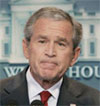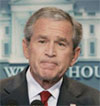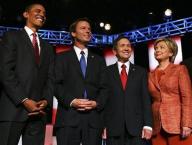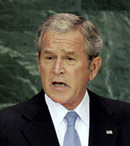|
|
|
Bush defends US interrogation methods
Politics |
2007/10/07 11:06
|
| President Bush defended his administration’s methods of detaining and questioning terrorism suspects on Friday, saying both are successful and lawful. "When we find somebody who may have information regarding a potential attack on America, you bet we’re going to detain them, and you bet we’re going to question them," he said during a hastily called Oval Office appearance. "The American people expect us to find out information, actionable intelligence so we can help protect them. That’s our job." Bush volunteered his thoughts on a report on two secret 2005 memos that authorized extreme interrogation tactics against terror suspects. "This government does not torture people," the president said. Meanwhile, Senate Armed Services Committee Chairman Carl Levin, D-Mich., demanded a copy of a third Justice Department memo justifying military interrogations of terror suspects held outside the United States. In a letter to Attorney General-nominee Michael Mukasey, Levin wrote that two years ago he requested - and was denied - the March 14, 2003, legal opinion. Levin asked if Mukasey would agree to release the opinion if the Senate confirms him as attorney general, and cited what he described as a history of the Justice Department stonewalling Congress. |
|
|
|
|
|
|
Bush Says US 'Does Not Torture'
Politics |
2007/10/05 04:44
|
| President Bush defended his administration's detention and interrogation policies for terrorism suspects on Friday, saying they are both successful and lawful. "When we find somebody who may have information regarding a potential attack on America, you bet we're going to detain them, and you bet we're going to question them," he said during a hastily called appearance in the Oval Office. "The American people expect us to find out information, actionable intelligence so we can help protect them. That's our job." Bush was referring to a report on two secret memos in 2005 that authorized extreme interrogation tactics against terror suspects. "This government does not torture people," the president said. The two Justice Department legal opinions were disclosed in Thursday's editions of The New York Times, which reported that the first 2005 legal opinion authorized the use of head slaps, freezing temperatures and simulated drownings, known as waterboarding, while interrogating terror suspects, and was issued shortly after then-Attorney General Alberto Gonzales took over the Justice Department. That secret opinion, which explicitly allowed using the painful methods in combination, came months after a December 2004 opinion in which the Justice Department publicly declared torture "abhorrent" and the administration seemed to back away from claiming authority for such practices. A second Justice opinion was issued later in 2005, just as Congress was working on an anti-torture bill. That opinion declared that none of the CIA's interrogation practices would violate the rules in the legislation banning "cruel, inhuman and degrading" treatment of detainees, The Times said, citing interviews with unnamed current and former officials. "We stick to U.S. law and international obligations," the president said, without taking questions afterward. White House and Justice Department press officers have said the 2005 opinions did not reverse the 2004 policy. Bush, speaking emphatically, noted that "highly trained professionals" conduct any questioning. "And by the way," he said, "we have gotten information from these high-value detainees that have helped protect you." He also said that the techniques used by the United States "have been fully disclosed to appropriate members of the United States Congress" — an indirect slap at the torrent of criticism that has flowed from the Democratic-controlled Congress since the memos' disclosure. "The American people expect their government to take action to protect them from further attack," Bush said. "And that's exactly what this government is doing. And that's exactly what we'll continue to do." The 2005 opinions approved by Gonzales remain in effect despite efforts by Congress and the courts to limit interrogation practices used by the government in response to the Sept. 11, 2001, terrorist attacks. The authorizations came after the withdrawal of an earlier classified Justice opinion, issued in 2002, that had allowed certain aggressive interrogation practices so long as they stopped short of producing pain equivalent to experiencing organ failure or death. That controversial memo was withdrawn in June 2004. The dispute may come down to how the Bush administration defines torture, or whether it allowed U.S. interrogators to interpret anti-torture laws beyond legal limits. CIA spokesman George Little said the agency sought guidance from the Bush administration and Congress to make sure its program to detain and interrogate terror suspects followed U.S. law. Senate and House Democrats have demanded to see the memos. "Why should the public have confidence that the program is either legal or in the best interests of the United States?" Senate Intelligence Committee Chairman Jay Rockefeller, D-W.Va., wrote in a letter to the acting attorney general. House Judiciary Chairman John Conyers and Rep. Jerrold Nadler, D-N.Y., promised a congressional inquiry. Sen. John McCain, R-Ariz., said he was "personally assured by administration officials that at least one of the techniques allegedly used in the past, waterboarding, was prohibited under the new law." A White House spokesman, meanwhile, criticized the leak of such information to the news media and questioned the motivations of those who do so. "It's troubling," Tony Fratto said Friday. "I've had the awful responsibility to have to work with The New York Times and other news organizations on stories that involve the release of classified information. And I can tell you that every time I've dealt with any of these stories, I have felt that we have chipped away at the safety and security of America with the publication of this kind of information." |
|
|
|
|
|
|
Craig's decision to stay a headache for GOP
Politics |
2007/10/05 02:46
|
| Some fellow Republicans are peeved that Sen. Larry Craig has decided to complete his term despite his earlier announcement about resigning, but the Idaho lawmaker still has his backers. "It's embarrassing for the Senate. It's embarrassing for our party," said Sen. John Ensign of Nevada, who leads the GOP's Senate campaign committee. "I think it's best for the U.S. Senate, it's best for certainly his party, that he just keeps his word," Ensign told reporters outside the Senate chamber Thursday. "He gave us his word he would do something, and he's backing out on us, and I don't think that's the right thing to do." A judge ruled Thursday that Craig's guilty plea to a misdemeanor disorderly conduct charge could not be withdrawn. Craig entered the plea after his June arrest in a men's room at the Minneapolis-St. Paul International Airport for allegedly propositioning a plainclothes police officer for sex. After news of his arrest and guilty plea broke in August, the senator announced that he would resign at the end of September, but he postponed that move while seeking to have his guilty plea withdrawn. However, after the judge's ruling Thursday, Craig said he'll remain in the Senate and study "additional legal options" -- much to the consternation of some GOP colleagues.  Watch how Craig's decision poses a challenge for GOP leaders » Watch how Craig's decision poses a challenge for GOP leaders » Sen. John Thune, R-South Dakota, called the issue "a distraction" for the party. "I would have hoped he would have done what he said he was going to do," added Sen. Norm Coleman, R-Minnesota. "He's chosen not to. The people of Idaho will have to speak to that, and the Ethics Committee will have to speak to that," Coleman said, referring to the Senate panel's indication that it will investigate Craig's conduct. Fellow Idahoan Sen. Mike Crapo was a rare voice in the caucus, issuing a statement in support of Craig's decision. "I look forward to serving with him as we continue to work on issues important to Idaho," Crapo said. But in Boise, a spokesman for Idaho Gov. C.L. "Butch" Otter said that the Republican governor already has settled on a replacement for Craig -- but won't name the choice until the senator steps down. Spokesman Jon Hanian denied that Otter, a longtime friend, is pushing Craig to go, saying the governor "just wants to be ready." A Craig resignation would give an appointee the advantage of being in office for a year or more before the next election. Craig said he won't seek re-election in 2008, a decision advisers said he had made earlier. The lack of an Idaho incumbent -- if that happens -- would complicate things for the GOP in what already is shaping up to be a difficult 2008 election. Four other Republican senators -- John Warner of Virginia, Chuck Hagel of Nebraska, Wayne Allard of Colorado and Pete Domenici of New Mexico -- have announced they will not seek re-election, and at least four others are expected to face tough races. "Democrats are cheering today," the Idaho Statesman newspaper said in an editorial urging Craig to go ahead and resign. "He and we will be distracted by a Senate Ethics Committee and its hearings, which could be public, in what is certain to be brutally ugly, possibly on live TV, and centered on men having sex with men," the editorial warned. Jasper LiCalzi, a political science professor at Albertson College of Idaho, told the Idaho Statesman that some voters still back Craig. "There is core support here that thinks Craig has been railroaded, and there's another group that thinks he should stick it out," LiCalzi told the newspaper. In his statement Thursday, Craig said any replacement would lack the seniority and committee assignments "that are valuable to Idaho." In addition, he said he wanted to clear his name before the Senate Ethics Committee. One of Craig's attorneys, Stanley Brand, said on NBC's "Today" show Friday that Craig is considering appealing the judge's ruling and seems willing to risk a Ethics Committee inquiry. "What he is saying is in 220 years of recorded history ... the Senate has never disciplined anyone for misdemeanor conduct that has nothing to do with official duties," Brand said on "Today." "So, while the Senate theoretically could do that, it hasn't, and our position is there is no reason to start now after 220 years." |
|
|
|
|
|
|
Obama stuck in 2nd place; hasn't risen in polls
Politics |
2007/09/30 08:27
|
| Barack Obama is the campaign rock star. But Hillary Clinton is still the woman to beat. Despite leading all of his rivals in the race for money, and boasting the largest grass-roots organization in modern political history, Obama is still far back in second place in most national polls. He's closer in Iowa but losing ground in New Hampshire. With 106 days to go before the Iowa caucuses, it's nearing now-or-never time for Obama to make his move. "It's kind of like horse racing. If you're a horse that does well in the last sprint, you wait. But if you wait too long, there's going to be too much distance for you to catch up and you're not going to make it," said Steffen Schmidt, professor of political science at Iowa State University. While supporters are impressed with Obama's signs of strength - his fund-raising prowess, the huge crowds at rallies, the Internet following - some are getting anxious that he hasn't risen in the polls. "I am worried that he hasn't done more to close the gap," said a New York lawyer who has donated the maximum $2,300 to Obama's campaign and spoke on condition of anonymity. "It's positive that he hasn't fallen farther behind." Preeta Bansal, a New York supporter, said she's not concerned. "It's going to be a long fall. The race is just beginning and he's on fire," said Bansal, referring to recent stump speeches where she said he's been "superb." New York City Councilman James Sanders, a Queens Democrat who supports Obama, conceded that supporters are "always concerned" and looking for the candidate to shine. But he said there's tremendous excitement for Obama, and real optimism that he can knock out Clinton. "On the ground, the people, the groundswell is growing," Sanders said. To overtake Clinton, the Obama campaign plans to drive home the message that the battle comes down to the following question: "Who do people think is most likely to bring about the change we need?" David Axelrod, a top Obama adviser, said the Illinois senator won't hesitate to draw sharp contrasts with Clinton where contrasts are "germane and real." But don't expect a smackdown any time soon. "I know there's a rooting interest, a kind of blood lust in the political community to see a kind of steel-cage match between Obama and Hillary," Axelrod said. "I don't think that's either politically smart or consistent with who he is." The campaign has pinned much of its strategy on winning Iowa. Polls show Obama is in a close three-way race there with Clinton and John Edwards. The campaign also has begun to deploy staff and build up ground operations in the states holding primaries on Feb. 5. And in the coming months, star supporter Oprah Winfrey "will do some things for us," Axelrod said. |
|
|
|
|
|
|
In a Democratic debate, rivals assail Clinton
Politics |
2007/09/27 07:40
|
| Democratic presidential candidates pounced on rival Hillary Clinton for her positions on Iraq and Iran in a debate on Wednesday as they sought to undercut her status as the campaign front-runner. Former North Carolina Sen. John Edwards, a distant third place in most national polls and needing a breakthrough performance, led the attack against Clinton on the campus at Dartmouth College. With the Democratic left-wing demanding a hasty U.S. timetable out of Iraq, Edwards criticized the New York senator for not ruling out that U.S. troops might engage in some combat missions in Iraq if she were to win the 2008 election. "To me that's a continuation of the war," Edwards said. "Combat missions mean that the war is continuing. I believe the war needs to be brought to an end." Edwards' broadside put Clinton on the defensive at a time when she is enjoying a comfortable lead in opinion polls and trying to appear above the fray. But there was no sign that the debate would prompt a major shake-up in the Democratic field. "There may be a continuing counter-terrorism mission," she said, while adding that "the vast majority" of American troops would be out of Iraq by the end of her prospective first term in 2013. The cross-fire on the campus of Dartmouth College came at the first debate of the critical autumn season leading up to the early voting contests in January ahead of the November 2008 election to replace President George W. Bush. Iraq was a dominant theme of the debate as Democrats seek a way to force Bush to change his war strategy, which may leave as many as 100,000 troops there by the time the next president is inaugurated in January 2009. |
|
|
|
|
|
|
Bush to toughen sanctions on Myanmar
Politics |
2007/09/25 10:09
|
| President Bush announced today that he planned to tighten sanctions against the military government in Myanmar and slap a visa ban on "those responsible for egregious human rights violations." In a speech at the United Nations, Bush focused on human rights, outlining new U.S. efforts to force the military rulers to accede to the demands of the democracy movement in the Southeast Asian nation once known as Burma. Calling on the U.N. to honor its human rights charter, Bush turned a spotlight on efforts to overcome dictatorships in Cuba, Zimbabwe and Sudan. He urged the organization to help control the spread of deadly diseases such as malaria, invest in education, particularly for women and girls, and to include poor countries in the global economy "with partnership, not paternalism." He urged the U.N. to reform its Human Rights Council, which in the past has been chaired by Libya and other dictatorships, and said that the United States was open to an overhaul of the U.N. Security Council. The council is made up of the United States, Russia, China, Britain and France. Bush said he thought Japan was "well qualified" for membership. The president began a three-day visit to New York on Monday for the 62rd meeting of the General Assembly. He met privately at the Waldorf-Astoria Hotel with Mahmoud Abbas, president of the Palestinian Authority, and Tony Blair, the former British prime minister who now represents the quartet -- the United States, Russia, the United Nations and the European Union -- seeking to bring about a broad peace agreement between the Palestinians and Israel. The General Assembly speech today veered away from the themes of terrorism and war that were the foundation of Bush's first speeches at the U.N. Instead, he turned to elements of foreign policy that carry less of an edge while still encouraging the spread of democracy and the fight against tyranny. The shift in tone comes at a time when Bush is struggling in a political world grown increasingly unfriendly, both at home and abroad. It was at the U.N. last year that Venezuelan President Hugo Chavez -- never a friend of Bush -- likened the American president to a visitor from the underworld, saying, "The devil came here yesterday, and it smells of sulfur still today." But even international allies are growing skittish. Britain, under new Prime Minister Gordon Brown, hopes to scale down its commitment of troops in Iraq. And at home, notwithstanding the Democrats' inability to force Bush's hand in Iraq, there are few signs that public opposition to the war is weakening. The president's history of laying out a hard line and challenging the United Nations to join him frequently has left him searching for friends in an organization that has been described with scorn by the White House. By contrast, the call for cooperation on a humanitarian agenda "certainly is a stronger message for a U.S. president than challenging the relevance of the United Nations," said P.J. Crowley, a senior fellow and the director for homeland security at the liberal Center for American Progress in Washington.
|
|
|
|
|
|
|
Agriculture Secretary Johanns resigns
Politics |
2007/09/20 07:06
|
| Agriculture Secretary Mike Johanns resigned after nearly three years in office on Thursday, clearing the way to run for the U.S. Senate in Nebraska, where he was a popular two-term governor. President George W. Bush announced the decision by Johanns, who became the latest in a series of senior officials to depart the administration including Attorney General Alberto Gonzales and Bush's longtime political adviser Karl Rove. Johanns was expected to announce his candidacy as early as Monday for the seat being vacated by fellow Republican Chuck Hagel after two terms. Analysts say Johanns would be the front-runner of four men seeking the GOP nomination. Nebraska is a Republican-leaning state. Democrats have talked of recruiting Bob Kerrey, a former U.S. senator and Nebraska governor who is now a university president in New York City. Democrats control the Senate, 51-49. As agriculture secretary, the mild-spoken Johanns pressed U.S. trading partners to remove barriers to U.S. beef, erected out of fears of mad cow disease, and to expand farm exports, which account for a quarter of farm income. He took the lead in administration proposals to deny farm subsidies to the wealthiest Americans. In his resignation letter to Bush, Johanns said the U.S. farm sector "is stronger than ever before," with high crop prices and record farm exports. "After careful thought and difficult deliberation, I am writing to inform you that I have decided to pursue a new opportunity to serve this great nation," wrote Johanns. Nebraska is a major grain and cattle-producing state. Democrats in Nebraska said Johanns was leaving USDA without completing an important task -- overhaul of U.S. farm policy this year. Johanns resigned as governor to become agriculture secretary in January 2005. Born in Iowa, Johanns practiced law in western Nebraska before election as mayor of Lincoln, the state capital, in 1991 en route to the governorship in 1998. He once said that for a former farm boy, being agriculture secretary was a dream job. Deputy Agriculture Secretary Charles Conner was named acting secretary until Bush nominates a permanent replacement. The Agriculture Department, with 100,000 employees, is in charge of crop subsidies, the national forests, a vast research network and public nutrition programs including school lunch and food stamps. Ferd Hoefner of the Sustainable Agriculture Coalition, said Johanns was the first USDA chief in decades to try to rein in farm payments and to show interest in beginning farmers. But lawmakers have faulted Johanns for the faltering campaign to create a nationwide animal-tracking system, originally embraced by the administration as a key safeguard against mad cow and other fearsome diseases. USDA relies on voluntary participation in the program. "He has been a clear and open advocate for ethanol within the administration," said Jay Truitt of the National Cattlemen's Beef Association. Truitt said Johanns "was the first to understand" how the explosive growth of the fuel ethanol industry would squeeze livestock and meat producers. |
|
|
|
|
|
|
Class action or a representative action is a form of lawsuit in which a large group of people collectively bring a claim to court and/or in which a class of defendants is being sued. This form of collective lawsuit originated in the United States and is still predominantly a U.S. phenomenon, at least the U.S. variant of it. In the United States federal courts, class actions are governed by Federal Rules of Civil Procedure Rule. Since 1938, many states have adopted rules similar to the FRCP. However, some states like California have civil procedure systems which deviate significantly from the federal rules; the California Codes provide for four separate types of class actions. As a result, there are two separate treatises devoted solely to the complex topic of California class actions. Some states, such as Virginia, do not provide for any class actions, while others, such as New York, limit the types of claims that may be brought as class actions. They can construct your law firm a brand new website and help you redesign your existing law firm site to secure your place in the internet. |
Law Firm Directory
|
|










